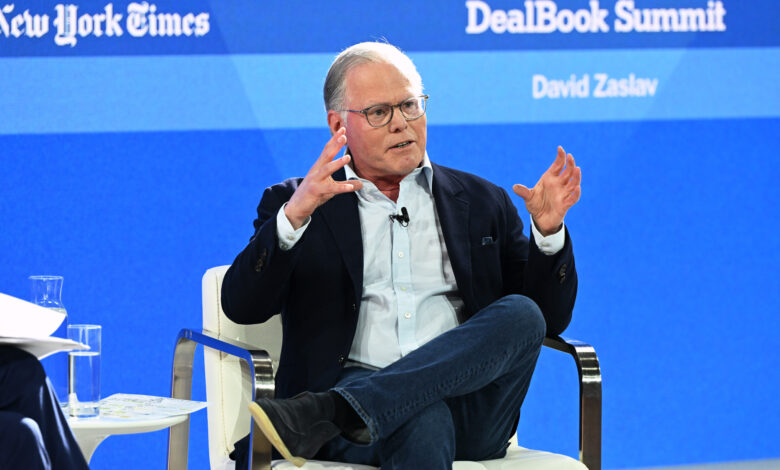Warner Bros. Discovery CEO David Zaslav’s lifeline to Paramount’s Shari Redstone not enough amid merger talk

Merger talks between David Zaslav of Warner Bros. Discovery and the people over at Paramount are at a “very early stage,” I am told. So is the air of desperation for both parties and the media industry in general.
If you haven’t noticed, this isn’t a great time to be running a media company. For now, Comcast makes a lot of money, combining cable and broadband with NBCUniversal’s various programming. But its stock is well off its highs.
Investors are calculating weak earnings growth from crappy ad revenues, cord-cutting and a lot more. Comcast’s cable business is sputtering. People aren’t going to the movies, and its streaming service, Peacock, lost $3 billion this year.
Yikes!
Disney is an even bigger train wreck. CEO Bob Iger probably wishes he was back on the beach instead of pitching his studio’s increasingly insipid programming. Likewise, his streaming service is equally a disaster, and no one believes his wokeness (transgender greeters at Disney parks and same-sex kissing scenes in animated movies) is going to help the bottom line.
Disney+ has lost $11.4 billion since inception in 2019.
Double yikes!
As CEO of Warner Bros. Discovery, the aforementioned “Zas” is doing a great job (under difficult circumstances) of combining WarnerMedia and Discovery. He’s streamlining and getting rid of merger debt. He has $5 billion in free cash flow to buy stuff. His stock is up nicely from its post-merger lows when investors bet Zas would be drowning in red ink.
Yet some red is still there in the form of debt — $40 billion of it. His streaming service barely breaks even (as if that’s a good thing), meaning he might be running a business slowly on the verge of doomsday.
One already there is Paramount, or course. It’s difficult to know where to begin in describing this mess. If current trends continue, the company’s streaming service could lose close to $2 billion this year on a market cap of around $10 billion. (By comparison, Comcast’s $3 billion in streaming losses comes on a market value of $177 billion.)
Paramount’s programming has been described as a “melting ice cube.” CBS has an NFL rights deal, but the costs are huge, and in an era of cord-cutting, even Sunday football is a ratings challenge as a younger generation watches games on their phones instead of TV.
It has a large studio in Paramount, but it loses money. It also has $15 billion in debt and scrounges to generate cash to pay bondholders, according to the ratings agency S&P.
So why does Zaslav (allegedly) want this POS? He’s a dealmaker first and foremost. He’s considered particularly adept at integrating businesses, a skill honed as a long-time executive of NBCUniversal, then owned by General Electric.
Then, GE was led by Jack Welch, also known as “Neutron Jack.” Zaslav, a Welch protégé, has cut lots of costs and he’s not finished. He also likes parts of the business (Paramount Studios and its library among them) and Paramount is desperate to sell.
Skepticism abounds
Most analysts, like LightShed’s Rich Greenfield, are skeptical. “This is bulls–t,” he tells me, noting that Zas would still be paying billions for that melting ice cube. Greenfield points to weeks of leaks about potential suitors — presumably from Paramount’s desperate bankers — with no concrete deal on the table.
Meanwhile, Zas has held only very preliminary talks, which also shows some hesitancy. Much of it is centered on buying the interest of Shari Redstone, who controls Paramount and its various assets (CBS, MTV, a studio) through National Amusements, the holding company created by her late father, media mogul Sumner Redstone.
Her stake is worth at most $2 billion, which is less than the deal price for the whole thing, though it’s unclear how that translates into shareholder value.
If he does pull the trigger, Zas will be solving Redstone’s and Paramount’s long-term problems — she obviously needs to unload the melting ice cube to preserve some semblance of her inheritance — but not his own. I’m told he knows the media business is coming apart, for all the reasons I outlined.
Zas also knows buying Paramount and successfully integrating it inside Warner Bros. Discovery is only delaying the market reaction to his (and Big Media’s) own inevitable moment of truth.
People who know Zas say his endgame is something grander: To ultimately team with Big Tech, which has the money and is becoming the ultimate distributor of programming.
But first he needs to buy some time — maybe buying Paramount with a successful integration does that — and then praying for a change in DC, from the deal-hating Biden lefties who would block Big Tech from getting bigger.
Donald Trump, if he’s the next president, wasn’t so deal-friendly either (recall his unsuccessful lawsuit to block the AT&T–Time Warner tie-up). But the regulatory types appointed by Trump will be much more free market than any of the apparatchiks in the Biden administration. And any free-market type will tell you the media business’s only real long-term solution is Big Tech.
“Warner Bros. Amazon” here we come — or so Zas hopes.




